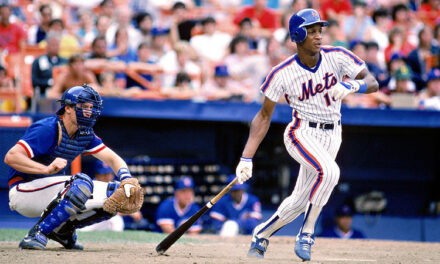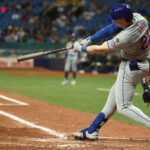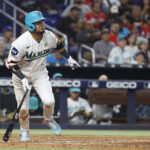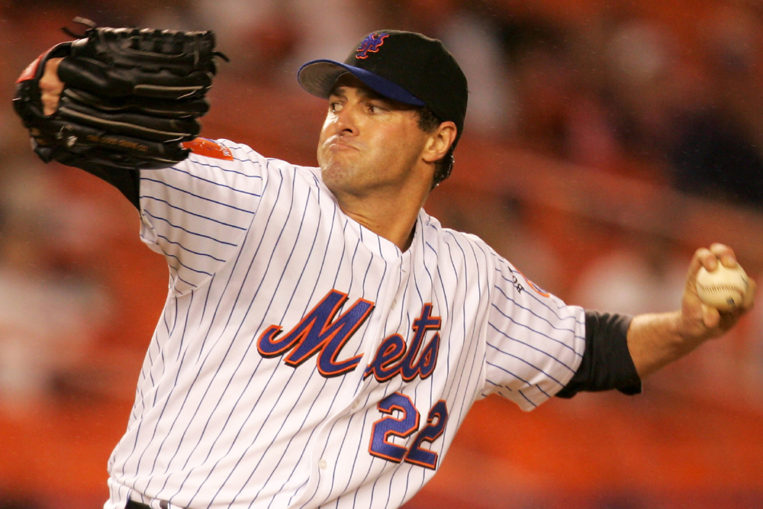
The date was October 4, 1999.
The New York Mets and Cincinnati Reds were getting set to embark on a Game 163, to decide who would be the National League wild card. After losing seven straight games in late September, the club clawed back in winning five of their last six, which tied the Reds’ record of 96-66.
Luckily for the Mets, the arm they turned to for this crucial play-in game was a man that never shied away from the spotlight – having appeared in two World Series in ’93 and ’97, and pitched a no-hitter in ’96 – New Jersey native, Al Leiter.
Leiter, 52, recalls that game in Cincinnati vividly. He remembers the raucous crowd, the playoff-like atmosphere, and being locked in the moment, hoping to send the Mets to their first postseason in eleven years.
An early two-run home run in the first from Edgardo Alfonzo set the tone, as Leiter cruised through one of the most memorable Mets starts in club history: firing a complete game, two-hit shutout in the Mets’ 5-0 win.
Leiter was so in-tune with the game that he recounts not realizing that he had a one-hitter going into the ninth inning. The first time he realized was after giving up a leadoff double in the ninth to Pokey Reese, as he turned his head to the scoreboard to see the Reds’ hit column change from one to two.
Leiter’s resume with the Mets is filled with quite the accomplishments. Among all-time Mets pitchers, Leiter is sixth in wins (95), sixth in game starts (213), ninth in ERA+ (124) and fourth in pitcher’s bWAR (28.0).
In the 2000 Subway Series, Leiter threw the most innings between both the Mets and Yankees (15.2), posting a 2.87 ERA with 16 strikeouts in his Game One and Game Five starts. In both games, Leiter kept the Mets in it, firing seven innings of two-run ball in Game One, followed by an eight-inning, two-run effort before giving up two more runs (one earned) in the ninth in Game Five.
In total, Leiter’s career spanned nineteen major league seasons, compiling a record of 162-132 with a 3.80 ERA, and 40.0 bWAR.
Considering that Leiter dealt with early elbow and blister troubles, not to mention two shoulder operations prior to his 25th birthday, his career truly blossomed later on in life.
In fact, since the ER became official in both leagues in 1913 and among starting pitchers from age 30 on, Leiter is one of 24 players to post the following stats:
- ERA+ of 115 or better
- 175 or more quality starts
- bWAR of 30.0 or better
His company here includes Hall of Famers such as Walter Johnson, Lefty Grove, Warren Spahn, Bob Gibson, Tom Seaver and Greg Maddux.
Since retiring from baseball, Leiter has offered his expertise and analysis for both the YES and MLB Networks, providing tremendous critiques and insight on a new crop of major league starters. His wit and fun-loving personality- paired with his immense baseball acumen – makes him a perfect fit as an analyst.
Leiter will always be remembered fondly for his time with the Mets, leading a staff that was ready to make some noise in the postseason after a decade-plus drought.
I had the privilege of speaking with Leiter in late February, where we discussed his early love for the Mets as a kid, his setbacks with injuries and Game 163 in 1999.
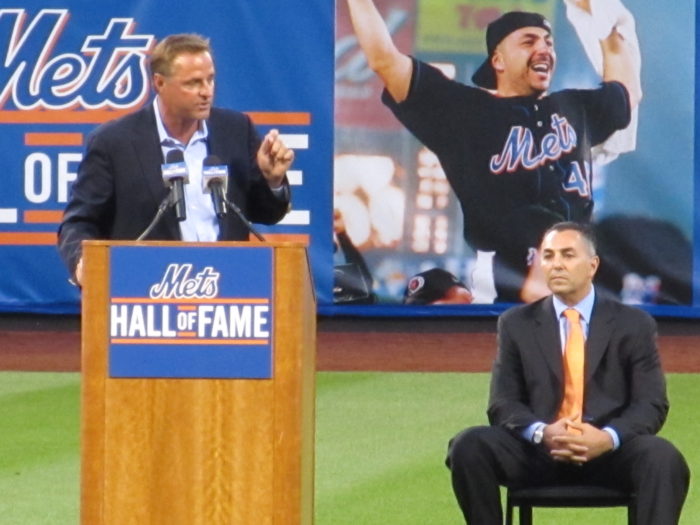
MMO: Who were some of your favorite players growing up?
Leiter: Tom Seaver, Jerry Koosman and Wayne Garrett. 1973 was more impressionable because I was eight-years-old. I do remember the ’69 Series; I was only five but I remember watching on my black and white TV.
Growing up in my house, my dad was a big Mets fan because of Casey Stengel and the “lovable losers.” He’s a guy that always wanted to root for the underdog, and it was easy because my dad was born in Manhattan, grew up in Islip and here come the Metsies!
I’m the last of seven, I have five older brothers and they were Met fans. It was easy to gravitate to Seaver but I liked Koosman. I remember the ’73 season a lot, certainly with John Milner standing out and I mentioned Garrett. Jon Matlack – he was an easy and fun guy to watch – and Tug [McGraw] was still there.
The blue and the orange, man, I grew up on that.
MMO: At what point during your development did you primarily pitch?
Leiter: I hit but I knew I was going to be a pitcher because of my size, strength and I threw hard. I had a lot of strikeouts and stuff like that.
I think at an early age, maybe a little past Little League, is when I started realizing that hitting was for fun and with pitching, I have a chance to play in college.
MMO: Prior to the 1984 Draft, did you have any notion that the New York Yankees were looking to select you in the second-round?
Leiter: No, actually the Yankees were a very big surprise. The teams that really stood out, and I did some sit down with the scouts and the evaluations, were the Angels, White Sox, Kansas City, Cubs and the Dodgers. The Orioles [as well], because I had two brothers that were in their system at the time.
The Yankees, no, they were kind of covert and I didn’t really see the Mets. [I met with] the Phillies, I was out at the Vet a couple of times leading up to the Draft.
The day I was drafted the local radio guy came down to my high school field and I wasn’t pitching that day and he said, “We just got off the wire, you were drafted in the second-round by the Yankees.”
I’m like, ‘The Yankees?’
Three years later I’m pitching at Yankee Stadium! That whole, you’re a Mets fan/you’re a Yankees fan, you hate the Yankees/you hate the Mets, well I grew up a Mets fan and three years out of high school I’m pitching at Yankee Stadium!
Don Mattingly is my first baseman, Willie Randolph is my second baseman. I’m throwing to Rick Cerone. Dave Winfield’s in right field, Rickey Henderson is in left. I’m in the same rotation with Tommy John, Rick Rhoden and Ron Guidry; it’s crazy! It was pinch-me kind of stuff.
MMO: And while you were in the Yankees’ system, you learned your trademark cutter from Guidry?
Leiter: It was really a slider, I was a fastball/curveball guy through the minor leagues. [Dave] Righetti via Guidry kind of showed me a different grip on my slider and then I started throwing sliders pretty well.
Over the years, my slider evolved into a cutter because I threw it really hard. That kind of ended up being my pitch.
Of course, I threw a fastball, curveball, change, but mostly the cutter was very effective.
MMO: Early on in your career, you dealt with several setbacks with injuries, including two shoulder surgeries. How difficult was that period for you, and how did you deal with it on the sidelines?
Leiter: Yeah, extremely. So listen, I was a good student. I did choose the University of Florida but I had scholarships to go to Northwestern and Stanford and some other good schools. School and academics did matter but I grew up in a family that was not even close to wealthy; very blue-collar and middle class. Money and the signing bonus the Yankees gave me did matter and it was life-changing kind of stuff back then.
I thought I was going to be an engineer, play a few years in the minor leagues, not make it, and go to Rutgers and get some kind of engineering degree. I was always interested in mechanical drawing and I thought [I would be] some sort of mechanical engineer.
When that all played out and I had my first shoulder surgery at 23 and my second shoulder surgery at 25, I lost a good four years, almost five years from when I was 23 until I eventually got back at 26. It was a good four seasons.
I went back to school. I got my college degree, got sponsored by a Wall Street firm, I got my Series 7 [license]; I thought I was done.
I revamped my delivery, changed much about everything I did prior to my two shoulder operations and I pitched thirteen more years from 26-years-old until I retired at 40.
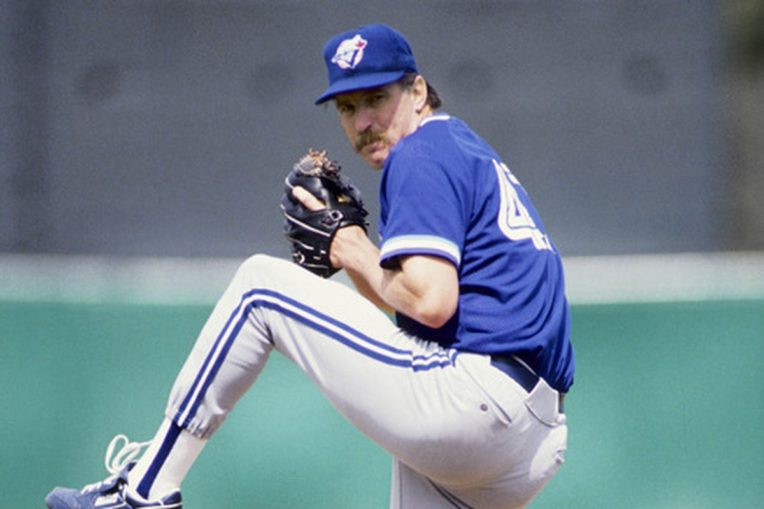
Photo by US Presswire
MMO: In 1996 you posted your best season to date, eclipsing the 200-inning mark for the first time, winning 16 games and posting a 2.93 ERA. You also tossed a no-hitter on May 11th against the Colorado Rockies. To you, what made that season so special?
Leiter: So 1993 was really my coming out party. I pitched Game Two of that year. I was supposed to be the fifth starter but Dave Stewart had an injury and I followed Jack Morris. I started and relieved but mostly started.
During the postseason in the ALCS against the White Sox that year, Cito Gaston picked Todd Stottlemyre as our fourth starter. We had a really good team, I liked it.
I pitched out of the pen for the first time ever and then pitched in the pen through the World Series. That was kind of where I was healthy and had a good plan. I had a good routine, a good process, I was back and I threw the ball well.
Then ’94 was very quirky for many of us; we had the strike and the season ended early. The Blue Jays as a whole, we just didn’t get going and it was very weird. From 1992-93 we won back-to-back World Series, ’94 we tried but it just wasn’t good. 1995 I also had a good year, innings weren’t as high as 200 but I threw well, that was kind of where it really started for me.
Then I signed that winter with the Marlins. So from ’95 to about ’01-02, a nice little six-seven-year window where I just felt healthy and I had an idea and I learned how to pitch better.
So 1996 National League, I throw a no-hitter, make my first All-Star team, all of that. The whole proverbial never give up, believe in yourself, and keep working hard [thing].
MMO: What were your initial reactions when you heard you were traded to the Mets in February of 1998?
Leiter: I was thrilled. I knew what was happening and I was one of the last guys to get traded in February. I knew we were all getting traded; anybody who was making anything above the minimum was out of there.
I remember the day before Dave Dombrowski called me and said, “Listen, I’m not promising you anything. I’ve been talking with Walt Jocketty and the Cardinals and Steve Phillips and the Mets.”
He was not doing me a favor if the prospects were not right but he asked if I had a preference.
I said, ‘Dave, first of all, thank you for calling me. That’s very nice of you and I know what’s going on with the club. I grew up a Mets fan. I was a huge Mets fan as a kid and Shea Stadium and every time you go there as a visiting player I’d stay late and hang out. Honestly, that would be a dream come true.’
He said, “All right. Again, I can’t promise you anything.”
It wasn’t a full day later I get traded and it’s a package of A.J. Burnett and a few other players. Total, total thrill. Not only to get back to New York but to play for the team you rooted for as a kid.
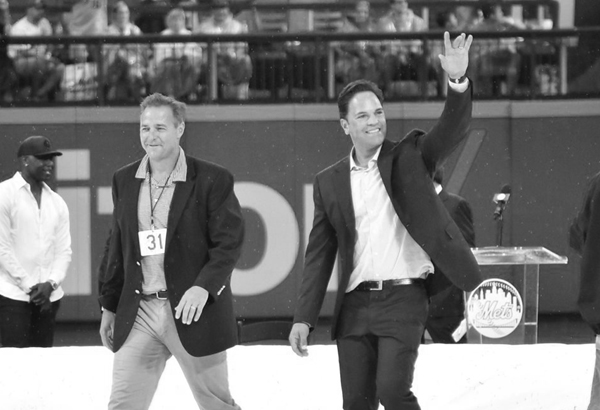
MMO: Where does Game 163 of the 1999 season rank for you in your career?
Leiter: Usually, when asked that question, I put it second only to Game Seven of the World Series where it’s a take-all. While that’s a winner take all – winner move on in a Game 163 – a Game Seven start is stuff you just dream about in the backyard.
I pitched well, we eventually win in extra innings and we beat the Indians in the World Series [1997]. That to me, even though it wasn’t as good a game – six innings, two runs – it was great.
A subset 1A is that game.
Knowing that the Mets hadn’t been in the postseason for many years and I’m in my second year back with the Mets, we pushed and almost made the playoffs in 1998. But here we are trying to make the playoffs in ’99.
I knew that I was pitching either Game One against Randy Johnson and Arizona, or I was going to pitch this 163rd game.
We fly into Cincinnati, a raucous crowd, and I was locked in. We got early runs and it was awesome.
Certainly, a two-hit shutout is beyond dream stuff. I can tell you how locked in I was: it was in the ninth inning and Pokey Reese hits a double to left field, and I’m getting the ball back from Rey Ordonez at short. At Cinergy Field, I remember seeing in the ninth inning the one hit for Cincinnati changing to two hits. I remember turning around on the mound and looking back to [Mike] Piazza behind home plate and I’m like, Holy shit!
I’m not kidding you. I said this to myself: ‘I had a one-hitter?!’
I was just so make my pitch, make my pitch, make my pitch. It was like a profound thing. I got the ball, I knew we were going to win, it was five zip. It was one of those special games where everything was just right, and a big moment. Huge, huge thrill.
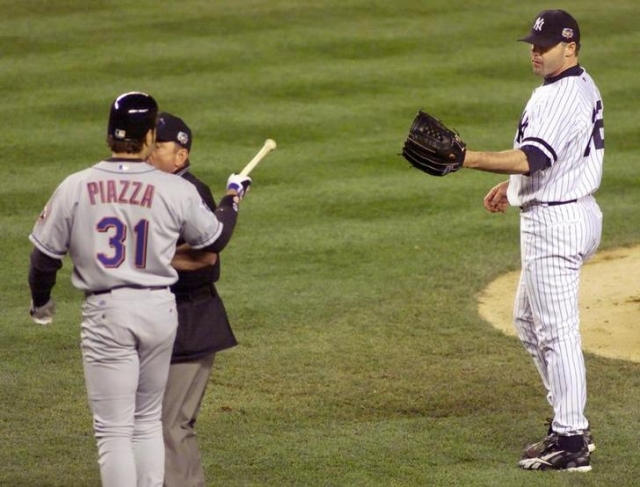
MMO: Your two starts in the 2000 Subway World Series were extremely solid as well. In total, you pitched 15.2 innings over two starts (Game One and Game Five), with 16 strikeouts and a 2.87 ERA. Talk a bit about that Series.
Leiter: First of all, if we win Game One we beat the Yankees. I’m convinced of it. They had everything to lose and nothing about it to gain. They were the mighty Yanks, and here we were the Mets, a really nice team but certainly not the Yankees. Are you kidding?
My Game One I went seven innings, we were winning 2-1 and lost in extra innings. That was freaking awesome and I loved the challenge. Yankee Stadium, Andy Pettitte, all the Yankee lore and I was like, Bring it on, baby! I’m getting after it and I’m going to kick your ass, we end up losing which was very unfortunate.
Then the next game with [Mike] Hampton and the broken bat and Piazza and all of that. Just being down 0-2 I felt that I really felt like if we won Game One, the Yankees faced a lot of bullshit pressure/heat. They’ve got to win, they’ve got to win, they’re the Yankees! That was so deflating when you’ve got a shot and your closer’s in the game to win the game and it ends up not happening and we lose in extra innings. That one hurt. And then we win Rick Reed‘s Game Three.
I don’t know, hindsight’s, who knows? It was awesome for someone who really relished the whole New York/New York thing and the Subway Series and Mets fans/Yankee fans. I was a Met fan growing up and I started with the Yankees, cut short prematurely by injury and then the trade and here I am back. It was great, I was living the dream.
MMO: I’ve spoken to some of your former teammates (Glendon Rusch, Todd Zeile, Pat Mahomes) who have all commented on the camaraderie the teams in 1999 and 2000 had. Was that something you noticed as well?
Leiter: Yeah, I’m a big believer in it and I can tell you it mattered to me. Being one of the older guys that got it and wanted the cohesiveness and needed the cohesiveness of everybody in the room no matter if you were Piazza or utility infielder or a guy that didn’t pitch a whole lot out of the pen. I, along with Johnny Franco, who led the way, we had a great bunch and it was by design. It was by purpose.
If we were flying into a city on a Sunday and it was a day game and we got into whatever city, we’d make sure everybody knew, hey, we’re going to dinner. Morton’s, here, there. I don’t care if you want to go out or not you better be there, you’ve got to eat dinner.
We had a lot of times where it was fifteen to eighteen players at a restaurant. I can’t tell you how a facet of missing the playing days is of the camaraderie of your teammates and the baseball life. The importance of good teams being better because of us having a better room, a better unit, no bullshit. Not saying stuff didn’t come up where you have to put out the brush fires once in a while, but we had a nice, really tight room.
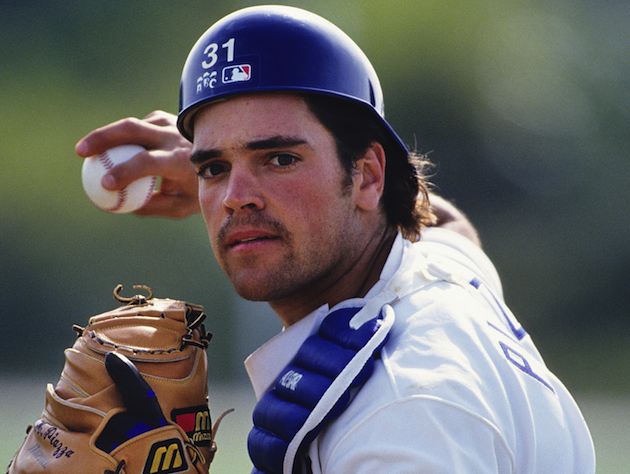
MMO: For your career, the catcher that you had behind the plate most was Mike Piazza. In recent years his defense has received better merit due to his pitch framing abilities. How was he for you behind the plate?
Leiter: I liked him. Mike got hitting, of course, he’s great. He also got what I thought was a real good strength of his: he knew every one of his pitchers and their strengths and weaknesses. He really kind of laid on, if you’re going to get beat, get beat with your best stuff.
It was a great relationship. I’m tight with Mike, we’re friends on and off the field. It was assurance and reassurance of a guy that was not only a prolific hitter and the center of our lineup, but he really gave a crap about wanting to catch a good game. And because of the criticism of him that [catching] wasn’t the best part of his game, he worked his ass off at it.
He didn’t just say I’m a hitter and I don’t care about the defense. Not at all, man. He was always working at it. He did get a bum rap – he didn’t have Benito Santiago or Tony Pena’s arm – but it was more than enough and he cared about catching a good game and I thought he framed as good as anybody.
MMO: You were on the mound for the first game back after baseball resumed following the horrific terrorist attacks on 9/11. What was that day like for you and what were your emotions on the mound in Pittsburgh?
Leiter: Yeah, that was tough. I was in Manhattan, I was actually on the tarmac flying to Pittsburgh when that happened. My daughter had her first day of first grade in Manhattan. I figured Pittsburgh is so close and I took an 8 a.m. flight and the rest is history; we know what happened that day.
Baseball seemed inconsequential, it really didn’t seem relevant. We also knew we had a job and obviously what we eventually realized the day we came back and played the Braves in New York was how important baseball actually mattered at that time, and how we were able to help heal.
I’d be lying to you, man, pitching that game in Pittsburgh it just didn’t feel like it really mattered. [We] still had a job to do and I think I pitched well and we won.
That was tough. That was a tough time.
MMO: You would work in the studio and booths during postseason games you weren’t a part of during your career at times. Did you realize early on that your second career would be as a broadcaster and analyst?
Leiter: My feeling was this, and I’ve been asked to coach, I’ve been asked to be in different organizations, front offices, and different teams have asked me if I wanted to be a part of their player development. I just value my family, I value my kids, I value my time. I was fortunate enough to make good money, I don’t do this for the money, I do this for the fun. I just thought, What a great way to stay in the sport that’s been very good to me and I can have great flexibility.
That was really the impetus behind doing TV stuff, so I just think it’s a fun gig, it’s just fun.
MMO: Have you ever thought about returning to the game as a coach or manager someday?
Leiter: I’ll be honest with you, I’ve had three of four teams that have asked me about coaching, and I’m talking big leagues. And no, I just know the schedule and I know what would have to be the commitment.
My son’s a junior in high school and I have two daughters, one’s still in college and the other just graduated. I have a seventh-grade daughter. I know what that life is like and yeah, no.
What I am intrigued with is to be with an organization someday on an advisory/player development [level]. In the room, helping with an idea or opinion on the roster, that intrigues me and I think that would be interesting.
MMO: When you reflect back on your 19-year career, what are you most proud of?
Leiter: I think what I’m most proud of is not a game and it’s not a stat. I was very aware that I was blessed every time I put on a major league uniform and I was very cognizant of giving my best. Being mentally and physically prepared to do the best that I was capable of. I never cheated any body or a fan. What you saw might’ve been a bad game but what you saw was my preparation to be the best I can be.
I think I’m most proud of that and it was really based on failure, injury and doubt as to whether I would ever do anything in the big leagues after my injuries. When I came back in that 1993 season as a 27-28-year-old I always said, ‘I’m going to give everything that I had to be the best I could be today.’
I think that’s what I’m most proud of.
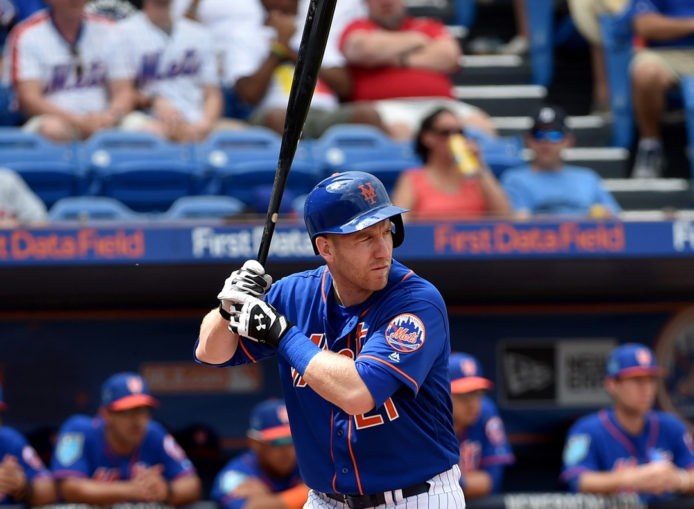
MMO: Looking ahead to the current 2018 season, what are your overall thoughts on the Mets this year?
Leiter: Health withstanding and the rotation pitches the way we’ve been talking about it now for the last couple of years? They’re a playoff team. I say that with little or no hesitation.
Now, are they better than the Nationals? No. Will they compete for one of the Wild Cards? Absolutely.
Other than the improvement of what Milwaukee has done, the Dodgers certainly head and shoulders, I think there’s no reason why the Mets can’t go from 70 to 90 wins. It sounds crazy because you’re talking about a twenty-game swing but I believe in their pitchers that much. I believe in the National League brand of baseball in winning 3-1, 3-2, 4-1, and I think A-Gon has a lot to prove, he was a hell of a player and a hell of a hitter when healthy.
Again, it is purely a health issue with this team. I love Todd Frazier, he’s going to rub off so much positive clubhouse chemistry, and I’m curious about [Amed] Rosario. I’ve heard about him but I haven’t seen much, but I want to see what he’s all about.
You get deGrom, Syndergaard, Harvey, Matz and these boys going and throw in a little Jason Vargas, this could be a good team.
MMO: Do you have confidence that we can see an improved Matt Harvey this year?
Leiter: I do, I like Matt a lot. My heart says I want Matt Harvey to have the year I think we know he can have. Beyond that, I haven’t seen him. I don’t know how he feels, I don’t know what he does in the training room, I don’t know all of that.
Assuming he’s healthy, I got him as a top guy in the National League. Somewhere in the ten-to-fifteen range.
MMO: Thank you very much for your time today, Al. It was great speaking to you.
Leiter: Right on, man. Take care.
Follow Al Leiter on Twitter, @Al_Leiter22





